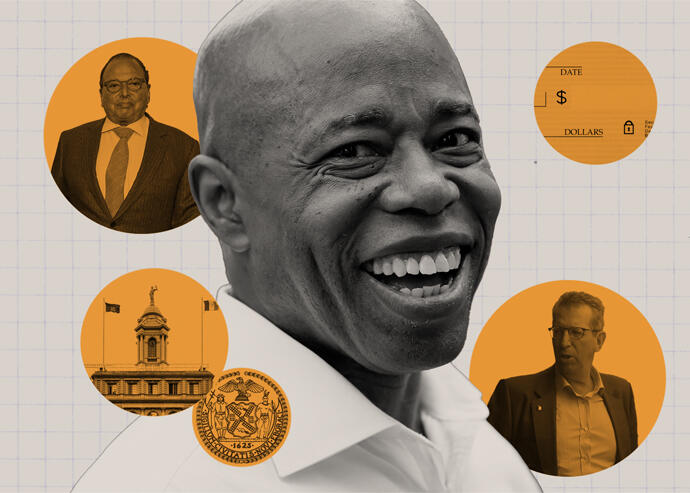
Powerful New York real estate firms and families, including Douglas Durst and Bill Rudin, have donated money to Eric Adams (Getty / Photo Illustration by The Real Deal)
In an 11-week span after Eric Adams became a shoo-in for the mayoralty, the real estate industry poured $500,000 into his campaign coffers.
Adams is the heavy favorite against Republican nominee Curtis Sliwa, the brash radio host and Guardian Angels founder. But Adams has been busy padding his campaign account, and property interests have played a big part.
Between July 12 and Sept. 27, members of some of New York’s most powerful real estate firms and families, including the Dursts, Rudins, Tishman Speyer, SL Green Realty and Thor Equities, gave to Adams, whose June victory in the Democratic primary essentially wrapped up the election.
One real estate source said the donations serve a purpose even if Adams’ victory is a foregone conclusion: “That’s the point — you give to incumbents, not because you can buy influence, but because if you don’t, they notice.”
SL Green employees have donated more than $11,000 to Adam’s campaign since July, the most of any real estate firm, according to campaign finance filings. Its donors include CEO Marc Holliday, the chief operating officer and the chief accounting officer.
The Rudin family and employees of its eponymous firm gave more than $12,000, and the Durst family and employees of the Durst Organization contributed more than $9,000.
A spokesperson for SL Green said the company “doesn’t endorse political candidates but our employees are encouraged to get involved civically, and many were early supporters of Eric Adams and his approach to accelerating the city’s recovery and growth.”
A representative for Rudin Management Company and the Durst Organization declined to discuss the donations. Tishman Speyer did not return a request to comment.
At least 524 real estate professionals donated after the primary to Adams, the Brooklyn borough president. But the actual number of real estate contributors is likely greater, as an untold number of gifts come from spouses and relatives whose industry connections are unclear, and from executives whose employer is omitted from disclosure forms.
The spate of giving swelled Adams’ campaign war chest to $7.7 million. He used some of his stockpile for a television ad released Tuesday, according to the New York Times. Sliwa has about $1.2 million.
Adams’ campaign is careful to portray him as not in the pocket of real estate.
“He appreciates the support of all contributors to his campaign who share his vision for a safer, fairer, healthier, more prosperous future for New York — but his priority has always been and will always be working people and those who are struggling, who need our government’s help the most,” a spokesperson said.
The industry contributed heavily to Adams ahead of the June 22 primary. He was seen as the real estate’s best option among the early favorites, though some developers eventually also gave to former Sanitation Commissioner Kathryn Garcia when polls showed her gaining on Adams. She eventually lost by 1 percentage point.
Adams’ moderate politics, ostensible support for housing development and focus on curbing crime appealed to the real estate industry. His victory was a relief to professionals who feared a progressive, defund-the-police candidate such as Maya Wiley might win. But Adams has pushed to downsize Brooklyn developments that apply for new zoning.
In his post-primary ad, Adams emphasized the need to invest in affordable housing, universal child care and early childhood education. He has pushed for changes to the city’s Mandatory Inclusionary Housing program and recently announced a plan to convert hotels in the outer boroughs to affordable housing.
While some Democratic candidates vowed not to accept real estate money, Adams balked at rejecting contributions from entire industries. In fact, over the past few months, real estate professionals have hosted fundraisers for Adams, including one in the Hamptons held by Republican billionaire John Catsimatidis, CEO of Red Apple Group and grocery store chain Gristedes.
Because Adams’ campaign accepts public matching funds, individual donations to it cannot exceed $2,000 — a nominal amount for business people with millions of dollars’ worth of investments riding directly or indirectly on the decisions and performance of city agencies and lawmakers.
The limit, which has been lowered over the years by city law, is intended to curb the influence of donors. But it also allows donors to make maximum contributions and potentially gain the favor of candidates without writing large checks. Some wrote large checks anyway, forcing the Adams campaign to refund amounts that exceeded $2,000.



